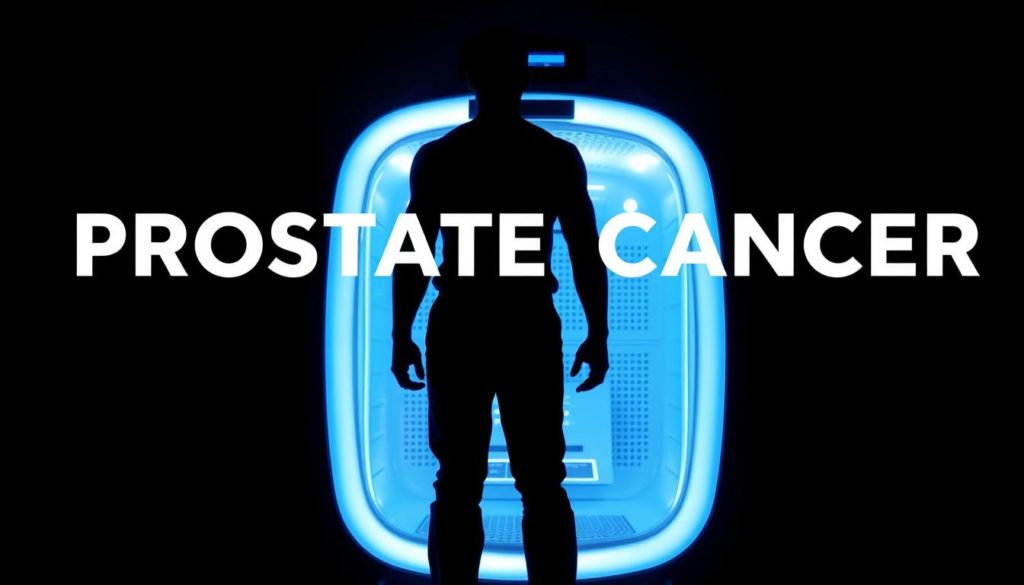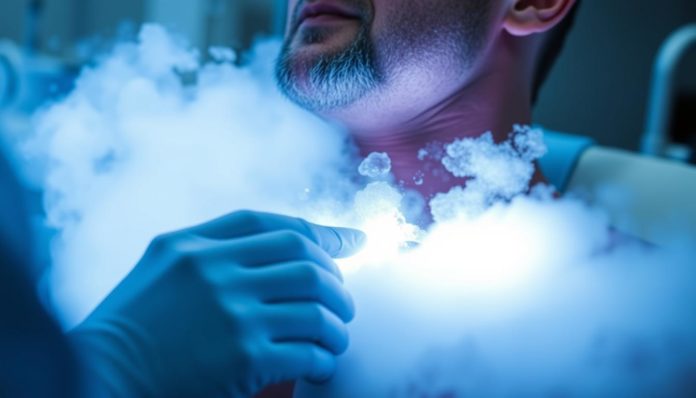Did you know that over 40,000 men in the United States choose Cryotherapy for Prostate Cancer each year? This method uses extreme cold to destroy cancer cells. Because of its good results and short recovery time, it’s becoming more popular.
It’s a top choice for early-stage prostate cancer that’s still in the prostate. It’s also used when cancer comes back after other treatments.
Prostate cancer treatments are getting better, and Cryotherapy is leading the way. It now aims to keep the quality of life high for patients, despite some risks like sexual dysfunction. Read on to find out how Cryotherapy offers a new hope for those fighting prostate cancer.
Introduction to Cryotherapy for Prostate Cancer
Cryotherapy is a modern way to fight prostate cancer without surgery. It’s also called Prostate Cancer Cryoablation. This method uses extreme cold to kill cancer cells safely.

What is Cryotherapy?
Cryotherapy, or cryoablation, uses argon gases to freeze cancer cells. This freeze-thaw cycle destroys the cells without needing invasive procedures. It’s a less severe option for those with prostate cancer.
How Cryotherapy Works
Doctors start Prostate Cancer Cryotherapy by inserting cryoprobes into the prostate. They use ultrasound to guide these probes, which then freeze the cancer. This cold kills the cancer cells and stops their blood supply.
This method doesn’t just stop cancer cells; it destroys them for good. It’s effective and offers hope for less invasive treatments. This technology could change how we treat prostate cancer, offering a new path away from surgery.
Who Can Benefit from Cryotherapy Prostate Cancer Treatment?
Cryotherapy is a good option for many patients. Men with localized prostate cancer that hasn’t spread can benefit a lot. It’s a surgery alternative and helps those who can’t have traditional surgery or radiation.
This method is best for men with smaller prostates. It freezes and kills cancer cells. But, it might not work as well for large tumors or widely spread cancer. Also, men with past surgeries or issues with prostate ultrasound might need other options.

Cryotherapy benefits for prostate cancer include being less invasive. It often has fewer side effects than other treatments. This makes it attractive for many looking for simpler options.
In short, cryotherapy offers a valuable alternative for surgery. It suits those who can’t go through conventional treatments and those seeking less invasive methods.
The Cryotherapy Procedure for Prostate Cancer
Cryotherapy for Prostate Cancer involves steps and preparations that are key. Each part must go right to lower side effects and make the treatment successful.
Preparation for the Procedure
Before the procedure, patients might need to prep their bowel and take antibiotics. Doing this helps the body get ready and lowers complication risks.
Steps of the Procedure
This prostate cancer treatment is done under anesthesia. Ultrasound probes are then put through the perineum into the prostate. They’re placed with ultrasound images to target the cancer well.
The technique involves two freezing cycles to destroy the prostate tissue. This approach aims to get rid of cancer cells as much as possible. After, patients might stay in the hospital overnight or go home the same day. It depends on how they heal and what the doctor says.
Post-Procedure Care
After the treatment, it’s important to deal with soreness and help the urethra heal. Often, a catheter is used and stays in for around two weeks. Antibiotics are also given during this time to ward off infections. This care after surgery helps in a smooth recovery and lowers the chance of problems.
Advantages of Cryotherapy Over Traditional Surgery
Finding the right Prostate Cancer Treatment Options can be tough. Luckily, the Cryotherapy Benefits for Prostate Cancer offer a simpler choice for many. It’s especially true when comparing cryotherapy to traditional surgery.
Minimally Invasive Nature
Cryotherapy’s key advantage is that it’s minimally invasive. Traditional surgery often requires large cuts and leads to lots of blood loss. Cryotherapy, however, uses only tiny needles for the prostate. This means fewer problems and a faster healing time.
It targets only the cancerous tissues. This leaves the healthy areas around them untouched.
Reduced Recovery Time
Recovery time is also much shorter with cryotherapy. After the usual prostate surgery, it might take weeks or months to get better. There’s usually pain and a long downtime. But with cryotherapy, you can get back to your life in just a few days.
It’s a more convenient Prostate Cancer Treatment Option for many folks.
Lower Risk of Side Effects
There’s generally a lower risk of side effects with cryotherapy than surgery. Of course, all medical treatments have risks. But cryotherapy lessens them by minimizing body trauma. You won’t see as much infection, bleeding, or lasting pain as you would with surgery.
This makes it a top pick for those seeking Prostate Cancer Treatment Options.
The Cryotherapy Benefits for Prostate Cancer indeed make a compelling case to choose it over surgery. Its benefits like being less invasive, quicker recovery, and fewer side effects are appealing to many tackling prostate cancer.
Potential Side Effects of Cryotherapy for Prostate Cancer
Cryotherapy is a hopeful way to treat prostate cancer. But, it’s key to know about possible side effects. They can vary and knowing them helps in making choices.
Common Side Effects
Cryotherapy can lead to some side effects for prostate cancer patients. They usually face:
- Erectile dysfunction
- Pain and swelling of the scrotum and penis
- Blood in the urine
- Occasional loss of bladder control
These side effects from treating prostate cancer can be handled. They often get better over time.
Rare Complications
Some patients may encounter rare issues. These include:
- Injury to the rectum
- Obstruction of the urethra
- Infection or bleeding at the treatment spot
Talking to your healthcare provider about these risks is important. Do this before choosing cryotherapy for prostate cancer.
The Success Rate of Cryotherapy for Prostate Cancer
The cryotherapy success rate for prostate cancer is influenced by key factors. These include the cancer’s stage at detection and any recurrence after treatment. For many battling prostate cancer, cryotherapy offers hope among many treatment choices.
Success in cryotherapy requires regular check-ups. These include imaging and lab tests. They help track the treatment’s success and guide future actions.
| Factors | Impact on Success Rate |
|---|---|
| Stage of Cancer | Early detection generally leads to higher success rates. |
| Cancer Recurrence | Recurrent cancer might reduce the cryotherapy success rate. |
| Overall Health | Patients in good health often respond better to cryotherapy. |
Studies indicate that success rates are linked to the cancer’s spread and patient compliance. Thus, a healthy lifestyle and following your doctor’s advice are crucial. This way, you achieve the best possible results from cryotherapy.
Comparing Cryotherapy with Other Prostate Cancer Treatments
Patients and healthcare providers consider the benefits and limits of prostate cancer treatments. This section looks at how Cryotherapy for Prostate Cancer compares to surgery, radiation therapy, and hormone therapy.
Surgery versus Cryotherapy
Radical prostatectomy, a main treatment for prostate cancer, removes the prostate gland. It has a high chance of eliminating cancer. Cryotherapy offers a less invasive option. It needs less recovery time and usually has fewer side effects after the operation. Still, cryotherapy’s long-term success needs more research, which makes it a newer option than surgery.
Radiation Therapy versus Cryotherapy
Radiation therapy uses high-energy rays to kill cancer cells. Cryotherapy, a non-radiative option, lowers the chance of side effects like urinary and sexual dysfunction. Though both aim to eliminate cancer cells, cryotherapy’s targeted freezing method often leads to a faster recovery and less harm to nearby tissues.
Hormone Therapy versus Cryotherapy
Hormone therapy slows prostate cancer’s growth by lowering male hormone levels. Cryotherapy, on the other hand, directly destroys prostate tissue with extreme cold. It physically removes cancer cells, offering a focused treatment with possibly fewer whole-body side effects than hormone therapy.
| Criteria | Surgery | Radiation Therapy | Cryotherapy | Hormone Therapy |
|---|---|---|---|---|
| Invasiveness | High | Moderate | Low | None |
| Recovery Time | Long | Moderate | Short | Not Applicable |
| Side Effects | High | Moderate | Low | Variable |
| Long-term Efficacy | High | High | Under Study | Variable |
| Mechanism | Surgical Removal | Radiative Damage | Freezing Cells | Hormonal Regulation |
Patient Experiences and Testimonials
Learning from others’ journeys with Cryotherapy Prostate Cancer Treatment is enlightening. For many, it marks a turning point towards healing.
“Prostate Cancer Cryotherapy was less invasive than I expected,” one patient noted. “I quickly got better and was up and about in no time.” Another mentioned the treatment’s efficiency: “Afterwards, my PSA levels went down a lot, showing it worked.”
“Choosing Cryotherapy Prostate Cancer Treatment was the best decision I made. The minimal side effects and fast recovery allowed me to maintain my quality of life.” – Mike, a satisfied patient.
These experiences share the treatment’s gentle approach and its effectiveness in fighting cancer. They offer hope to those mulling over Prostate Cancer Cryotherapy as a treatment choice.
Is Cryotherapy the Right Choice for You?
Finding out if cryotherapy is suitable for treating prostate cancer needs careful thought. It’s key to see if this alternative to Prostate Cancer Surgery matches your health information.
Determining Your Eligibility
Several factors decide if you can choose cryotherapy instead of surgery:
- The stage of prostate cancer
- Overall health condition
- Previous medical treatments
The patient’s specific situation greatly impacts cryotherapy’s safety and success. Knowing all medical facts is critical.
Consulting with Your Doctor
Talking with your doctor is important when picking a treatment. Think about these when discussing cryotherapy:
- Pros and cons of cryotherapy
- Possible outcomes and risks
- How it fits with what you want and your treatment goals
This conversation helps you see if cryotherapy is what you need.
Future Developments in Cryotherapy Prostate Cancer Treatment
The world of cryotherapy is seeing exciting changes. These changes are because of non-stop efforts to make the treatment better. Scientists are working hard to make this procedure more accurate with the help of advanced imaging. This means doctors can spot cancer cells better and protect healthy tissue.
This progress in imaging will make cryotherapy even more effective against prostate cancer. It’s a big leap forward in treating this disease.
Another key area of research is studying how cells respond to cryoablation. Scientists want to understand how cancer and nearby tissues react to very cold temperatures. Their goal is to improve treatments so they can more effectively kill cancer cells with fewer side effects. This could lead to treatments that are more tailored to each patient.
There are also new therapies being explored, like High-Intensity Focused Ultrasound (HIFU) and others. These technologies could offer new ways to fight prostate cancer. Health professionals can use them to provide a wider range of treatment options to patients. To learn more about these advances, visit current advancements in prostate cancer treatment.
FAQ
What is Cryotherapy for Prostate Cancer?
Cryotherapy, also known as cryoablation or cryosurgery, is a method that fights prostate cancer by freezing it. It involves thin metal probes to freeze the cancer cells. Argon gas is used to kill cancer by cutting its blood supply.
How does Cryotherapy work to treat prostate cancer?
In Cryotherapy, doctors insert needles into the prostate using ultrasound for guidance. These needles emit extreme cold from argon gas, targeting cancerous tissue. The tissue then freezes and thaws, killing the cancer cells. The body naturally absorbs the dead cells.
Who can benefit from Cryotherapy for prostate cancer?
Men with prostate cancer that hasn’t spread can benefit from Cryotherapy. It’s especially good for those who can’t have surgery or radiation. It also works for men who have had cancer return after initial treatment. Those with smaller prostates are best suited for this.
What are the steps involved in the Cryotherapy procedure for prostate cancer?
First, patients prepare with bowel clean-up and antibiotics. During the procedure, under anesthesia, doctors place probes in the prostate through the perineum, guided by ultrasound. The freezing may take two rounds to kill all cancer cells.
Patients might stay overnight in the hospital or go home the same day. They will need a catheter for about two weeks.
What are the advantages of Cryotherapy over traditional surgery?
Cryotherapy is less invasive, causing less blood loss and needing no big cuts. Recovery time is shorter, allowing a quicker return to daily life. It’s safer, with less chance of surgery problems.
What are the common side effects of Cryotherapy for prostate cancer?
Side effects include trouble getting an erection, pain, and swelling in the groin area. Some men may find blood in their urine or have trouble controlling their bladder. Rarely, there might be infection or bleeding where the treatment was done.
How does the success rate of Cryotherapy for prostate cancer compare to other treatments?
Success with Cryotherapy varies with the cancer’s stage and if it’s come back. Keeping up with doctor visits and tests helps check if the treatment is working. The spread of cancer and patient health also play a role in its success.
How does Cryotherapy compare to other prostate cancer treatments like surgery, radiation, and hormone therapy?
Cryotherapy has fewer side effects and shorter recovery than surgery. Unlike radiation, it doesn’t use rays, possibly reducing sexual and urinary issues. It’s a localized treatment, directly targeting the prostate, unlike the broader approach of hormone therapy.
What do patient experiences and testimonials say about Cryotherapy?
Testimonials often praise Cryotherapy for being minimally invasive. Patients like its impact on life quality. Many are happy with how it handles side effects, lowers cancer return, and boosts wellbeing.
Is Cryotherapy the right choice for me?
Deciding on Cryotherapy depends on your cancer stage, health, and history. Talk to your doctor about the benefits and risks. This helps see if it fits your treatment goals.
What is the future of Cryotherapy for prostate cancer treatment?
Cryotherapy’s future looks bright, with ongoing advances aimed at lessening side effects and better results. Research is making procedures more accurate and understanding the body’s response to freezing better. This could make Cryotherapy an option for more patients.


